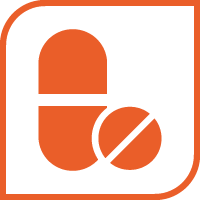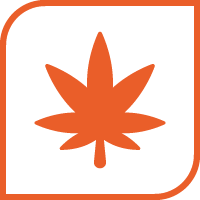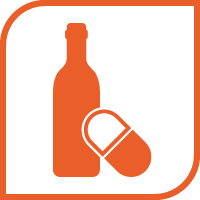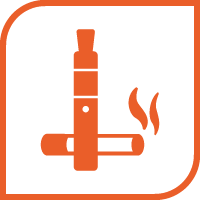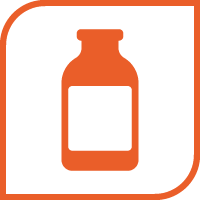4 – Make the Case
Having framed the conversation to reflect what youth care about, the next step is to share compelling reasons to avoid substance use. This table highlights statements considered most convincing by youth.
Note that some of these statements are specific to one particular substance, while others are more generally relevant.
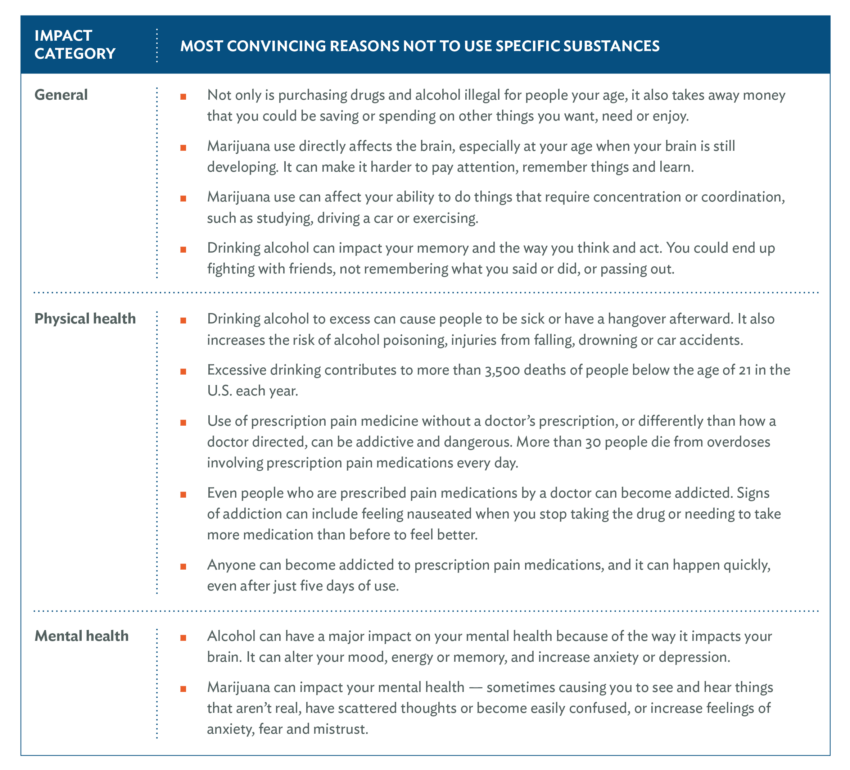
Make the Case: Specific Substance Use
Use these facts about the impact of these specific substances when having a conversation with young people.
Alcohol
General Impact
Drinking alcohol can impact your memory and the way you think and act. You could end up fighting with friends, not remembering what you said or did, or passing out.
Physical Health Impact
Excessive drinking contributes to more than 3,500 deaths of people below the age of 21 in the U.S. each year.
People your age who drink alcohol can get sick from use and have hangovers or put themselves at risk of harm from alcohol poisoning, car crashes from driving after drinking alcohol, and injuries such as falling or drowning.
Mental Health Impact
Alcohol can have a major impact on your mental health because of the way it impacts your brain. It can alter your mood, energy, memory, and increase anxiety and depression.
Delta-8 THC
General Impact
Delta-8 THC products may be marketed as a milder form of cannabis, but their strength and contents are variable, and their harmful effects are unknown.
Physical Health Impact
Delta-8 THC is not regulated so you don’t really know what is in it. Some people end up having a medical emergency because the concentration was too high or they didn’t realize Delta-8 THC was psychoactive until it was too late.
Mental Health Impact
Delta-8 THC affects brain function, and can cause vomiting, anxiety and dizziness if used in high concentrations.
Fentanyl
General Impact
To build a reputation for selling strong drugs, dealers sometimes mix especially dangerous drugs like fentanyl with other drugs like prescription pills.
Drugs, including prescription pills not prescribed by a doctor, do not come with an ingredients list. Many contain deadly doses of fentanyl.
Physical Health Impact
Teen overdose deaths have tripled over the last few years due to a dangerous substance called fentanyl. Fentanyl is often found in fake prescription pills.
It only takes a pinprick-sized amount of fentanyl to be a deadly dose. And it’s sometimes hidden in fake prescription pills.
Cannabis
Physical Health Impact
Since your brain is still developing, using cannabis during your teenage years can alter your brain chemistry. This affects your ability to pay attention and remember things, which can result in lower test scores and academic success.
Mental Health Impact
You might have heard people say cannabis use is fun. But, for some people, it leads to extreme paranoia and fear, scary hallucinations and dependency.
Polysubstance use
Physical Health Impact
Most overdose deaths happen when mixing drugs like prescription opioids or heroin with other drugs like antidepressants and/or alcohol.
Using more than one substance or drug at a time is never safe. That’s because the effect of mixing drugs is even stronger and less predictable than one drug alone. That makes it even easier to overdose or die.
Mental Health Impact
Using substances can increase the risk of mental health challenges, including depression, extreme paranoia and fear, scary hallucinations or even suicide. The risk of those is higher when using more than one substance at the same time.
Prescription drugs not prescribed by a doctor (OxyContin, Vicodin, Percoset)
Physical Health Impact
Use of prescription pain medicine without a doctor’s prescription or differently than how a doctor told you to use it can be addictive and dangerous. More than 30 people die from overdoses involving prescription pain medications every day.
Even people who are prescribed pain medications by a doctor can become addicted. Signs of addiction can include feeling nauseous when you stop taking the drug or needing to take more medication than before to feel better.
Mental Health Impact
Using prescription pills not as prescribed by a doctor can cause brain changes that increase feelings of depression and anxiety over time.
Vaping
General Impact
Vape companies regularly change up their chemical formulas to get around regulations and safety testing of their products.
Vape companies have a stronger motive to sell products than to care about the long-term health of their consumers.
Physical Health Impact
Even if your vape is labeled as nicotine-free, this could be an untrue marketing strategy. Ninety-nine percent of vapes tested by the CDC had nicotine in them, including ones that were labeled as nicotine-free.
Mental Health Impact
Some people think vaping is harmless, but it is associated with serious mental health effects, like anxiety, suicidal ideation and depression.
Substance Fact Sheets
When engaging in conversations of substance use, youth are likely to have questions and want to know more about the risks and impacts of drugs and alcohol. Therefore, it’s important that youth-serving providers are aware and knowledgeable about the most commonly used substances. The fact sheets below are intended to educate youth-serving providers and facilitate knowledge sharing with young people when delivering prevention messages and discussing substances.
This project is supported by the Centers for Disease Control and Prevention (CDC) of the U.S. Department of Health and Human Services (HHS) as part of a financial assistance award totaling $1,500,000 with 100% funded by CDC/HHS. The contents are those of the author(s) and do not necessarily represent the official views of, nor an endorsement by, CDC/HHS or the U.S. Government.



